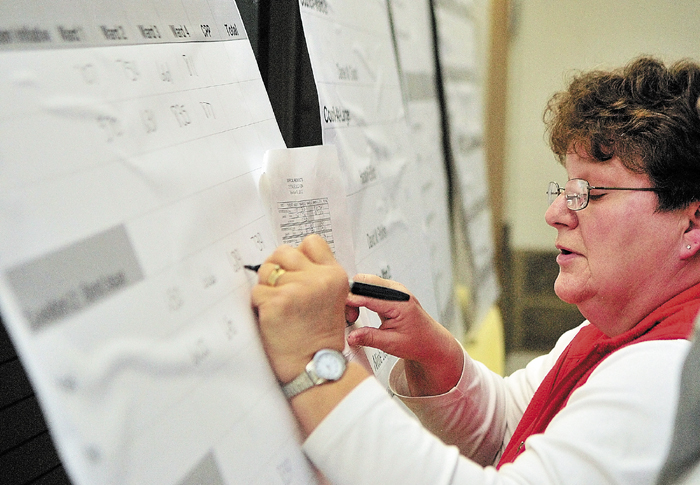Municipal clerks say new vote-counting machines that many Maine communities received as part of a federal initiative drastically cut down the time previously spent hand-counting ballots a week ago, on Election Day.
Even so, the new technology didn’t come without hiccups. Some voters in Belgrade and Waterville witnessed problems in the way the machines took the ballots, resulting in slight delays.
Most election clerks raved about the new machines, however.
“We had the totals by 9:30, and that’s including the few hand counts,” Sidney Town Clerk Shawna Foye said. “We probably would have been there till 4 or 5 in the morning with a couple tables if we had to hand-count.”
The election staff in Waterville was concerned initially when one of the machines that accepts ballots appeared to stop working, but City Clerk Patti Dubois said she discovered it was simply being “finicky.” Waterville already had electronic ballot-counting machines, but it received new ones for this year.
“It will still accept the ballots if you orient the paper in a certain way,” she said later on Election Day. “It won’t affect anything.”
In Belgrade, some voters had similar issues inserting ballots into the machine; it would reject a ballot several times before accepting it. Executive Secretary Mary Vogel said she wasn’t aware of any machine-related issues, and Town Clerk Cheryl Cook wasn’t available for comment.
Megan Sanborn, spokeswoman for the Department of the Secretary of State, said the office received some similar complaints on Election Day, but “if there were problems, they were few and far between.”
Staff members from the secretary of state’s office held regional training sessions before the election for all municipalities that received new machines, she said.
Most of the 64 municipalities that received the machines had been hand-counting ballots before that, according to Sanborn.
Maine is leasing the machines for five years for $1.4 million from Election Systems & Software with no additional cost to the municipalities, she said, besides any transportation cost incurred by election workers attending the training.
Foye said the training she and three other town election workers received helped make Election Day go smoothly.
The next phase of updating municipal election equipment will come in January, when the state begins to replace machines in the 120 cities and towns that already have them. The goal is to make sure all cities and towns are using the same machines, which will mean voters across the state will fill in ovals on their ballots, rather than connect arrows, Sanborn said.
Leasing the machines for the towns and cities this year, upgrading the rest using different machines and any training required will cost around $3 million to $4 million over the next five years, according to Sanborn.
One minor issue most clerks cited was the difficulty in inserting absentee ballots, which are folded, unlike Election Day ballots.
Chelsea Town Clerk Lisa Gilliam said they had to open the side compartment in the machine only twice to ensure the absentee ballots were received. She said they worked perfectly, other than those minor glitches.
Farmingdale Town Clerk Phyllis Weeks said the new machines were well-received by the residents, with the exception of one older man complaining that he liked the previous way better.
The only thing she’ll change next year is taking advantage of the ability to count absentee ballots before the election, instead of afterward.
“It didn’t take them quite as rapidly as they could have,” she said. “Other than that, it was an absolutely positive experience.”
Funding for the machines, software and training comes from the $17 million Maine received from 2002’s Help America Vote Act, which aimed at improving elections after ballot-counting problems arose in Florida during the 2000 presidential election, in which the principal candidates were George W. Bush and Al Gore.
Besides providing funding to replace voting equipment and improve election administration, the act established provisional voting, voter registration databases, voter identification procedures and administrative complaint procedures.
Staff writers Sue Cover and Matt Hongoltz-Hetling contributed to this report.
Paul Koenig — 621-5663
pkoenig@mainetoday.com
Send questions/comments to the editors.


